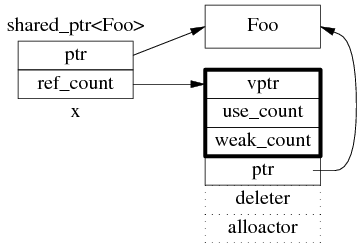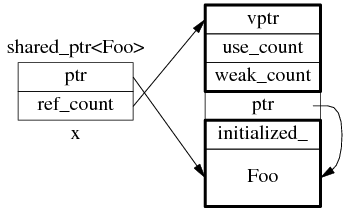一:
All member functions (including copy constructor and copy assignment) can be called by multiple threads on different instances of shared_ptr without additional synchronization even if these instances are copies and share ownership of the same object. If multiple threads of execution access the same shared_ptr without synchronization and any of those accesses uses a non-const member function of shared_ptr then a data race will occur; the shared_ptr overloads of atomic functions can be used to prevent the data race.
多线程环境下,调用不同shared_ptr实例的成员函数是不需要额外的同步手段的,即使这些shared_ptr拥有的是同样的对象。但是如果多线程访问(有写操作)同一个shared_ptr,则需要同步,否则就会有race condition 发生。也可以使用 shared_ptr overloads of atomic functions 来防止race condition的发生。
To satisfy thread safety requirements, the reference counters are typically incremented using an equivalent of std::atomic::fetch_add with std::memory_order_relaxed (decrementing requires stronger ordering to safely destroy the control block).
shared_ptr的引用计数本身是安全且无锁的。
http://en.cppreference.com/w/cpp/memory/shared_ptr
二:
It is only the control block itself which is thread-safe.
I put that on its own line for emphasis. The contents of the shared_ptr are not thread-safe, nor is writing to the same shared_ptr instance. Here's something to demonstrate what I mean:
// In main()
shared_ptr<myClass> global_instance = make_shared<myClass>();
// (launch all other threads AFTER global_instance is fully constructed)
//In thread 1
shared_ptr<myClass> local_instance = global_instance;
This is fine, in fact you can do this in all threads as much as you want. And then when local_instance is destructed (by going out of scope), it is also thread-safe. Somebody can be accessing global_instance and it won't make a difference. The snippet you pulled from msdn basically means "access to the control block is thread-safe" so other shared_ptr<> instances can be created and destroyed on different threads as much as necessary.
//In thread 1
local_instance = make_shared<myClass>();
This is fine. It will affect the global_instance object, but only indirectly. The control block it points to will be decremented, but done in a thread-safe way. local_instance will no longer point to the same object (or control block) as global_instance does.
//In thread 2
global_instance = make_shared<myClass>();
This is almost certainly not fine if global_instance is accessed from any other threads (which you say you're doing). It needs a lock if you're doing this because you're writing to wherever global_instance lives, not just reading from it. So writing to an object from multiple threads is bad unless it's you have guarded it through a lock. So you can read from global_instance the object by assigning new shared_ptr<> objects from it but you can't write to it.
结论:多个线程同时读同一个shared_ptr对象是线程安全的,但是如果是多个线程对同一个shared_ptr对象进行读和写,则需要加锁。
// In thread 3
*global_instance = 3;
int a = *global_instance;
// In thread 4
*global_instance = 7;
The value of a is undefined. It might be 7, or it might be 3, or it might be anything else as well. The thread-safety of the shared_ptr<> instances only applies to managing shared_ptr<> instances which were initialized from each other, not what they're pointing to.
多线程读写shared_ptr所指向的同一个对象,不管是相同的shared_ptr对象,还是不同的shared_ptr对象,也需要加锁保护。例子如下:
shared_ptr<long> global_instance = make_shared<long>(0);
std::mutex g_i_mutex;
void thread_fcn()
{
//std::lock_guard<std::mutex> lock(g_i_mutex);
//shared_ptr<long> local = global_instance;
for(int i = 0; i < 100000000; i++)
{
*global_instance = *global_instance + 1;
//*local = *local + 1;
}
}
int main(int argc, char** argv)
{
thread thread1(thread_fcn);
thread thread2(thread_fcn);
thread1.join();
thread2.join();
cout << "*global_instance is " << *global_instance << endl;
return 0;
}
在线程函数thread_fcn的for循环中,2个线程同时对*global_instance进行加1的操作。这就是典型的非线程安全的场景,最后的结果是未定的,运行结果如下:
*global_instance is 197240539
如果使用的是每个线程的局部shared_ptr对象local,因为这些local指向相同的对象,因此结果也是未定的,运行结果如下:
*global_instance is 160285803
因此,这种情况下必须加锁,将thread_fcn中的第一行代码的注释去掉之后,不管是使用global_instance,还是使用local,得到的结果都是:
*global_instance is 200000000
https://stackoverflow.com/questions/14482830/stdshared-ptr-thread-safety
三:为什么多线程读写 shared_ptr 要加锁?
以下内容,摘自陈硕的 http://blog.csdn.net/solstice/article/details/8547547
shared_ptr的引用计数本身是安全且无锁的,但对象的读写则不是,因为 shared_ptr 有两个数据成员(指向被管理对象的指针,和指向控制块的指针),读写操作不能原子化。根据文档(http://www.boost.org/doc/libs/release/libs/smart_ptr/shared_ptr.htm#ThreadSafety), shared_ptr 的线程安全级别和内建类型、标准库容器、std::string 一样,即:
• 一个 shared_ptr 对象实体可被多个线程同时读取(文档例1);
• 两个 shared_ptr 对象实体可以被两个线程同时写入(例2),“析构”算写操作;
• 如果要从多个线程读写同一个 shared_ptr 对象,那么需要加锁(例3~5)。
请注意,以上是 shared_ptr 对象本身的线程安全级别,不是它管理的对象的线程安全级别。
本文具体分析一下为什么“因为 shared_ptr 有两个数据成员,读写操作不能原子化”使得多线程读写同一个 shared_ptr 对象需要加锁。这个在我看来显而易见的结论似乎也有人抱有疑问,那将导致灾难性的后果,值得我写这篇文章。本文以 boost::shared_ptr 为例,与 std::shared_ptr 可能略有区别。
1:shared_ptr 的数据结构
shared_ptr 是引用计数型(reference counting)智能指针,几乎所有的实现都采用在堆(heap)上放个计数值(count)的办法(除此之外理论上还有用循环链表的办法,不过没有实例)。具体来说,shared_ptr<Foo> 包含两个成员,一个是指向 Foo 的指针 ptr,另一个是 ref_count 指针(其类型不一定是原始指针,有可能是 class 类型,但不影响这里的讨论),指向堆上的 ref_count 对象。ref_count 对象有多个成员,具体的数据结构如图 1 所示,其中 deleter 和 allocator 是可选的。

图 1:shared_ptr 的数据结构。
为了简化并突出重点,后文只画出 use_count 的值:

以上是 shared_ptr<Foo> x(new Foo); 对应的内存数据结构。
如果再执行 shared_ptr<Foo> y = x; 那么对应的数据结构如下。

但是 y=x 涉及两个成员的复制,这两步拷贝不会同时(原子)发生。中间步骤 1,复制 ptr 指针:

中间步骤 2,复制 ref_count 指针,导致引用计数加 1:

步骤1和步骤2的先后顺序跟实现相关(因此步骤 2 里没有画出 y.ptr 的指向),我见过的都是先1后2。
既然 y=x 有两个步骤,如果没有 mutex 保护,那么在多线程里就有 race condition。
2:多线程无保护读写 shared_ptr 可能出现的 race condition
考虑一个简单的场景,有 3 个 shared_ptr<Foo> 对象 x、g、n:
shared_ptr<Foo> g(new Foo); // 线程之间共享的 shared_ptr
shared_ptr<Foo> x; // 线程 A 的局部变量
shared_ptr<Foo> n(new Foo); // 线程 B 的局部变量
一开始,各安其事:

线程 A 执行 x = g; (即 read g),以下完成了步骤 1,还没来及执行步骤 2。这时切换到了 B 线程。

同时编程 B 执行 g = n; (即 write g),两个步骤一起完成了。先是步骤 1:

再是步骤 2:

这时 Foo1 对象已经销毁,x.ptr 成了空悬指针!
最后回到线程 A,完成步骤 2:

多线程无保护地读写 g,造成了“x 是空悬指针”的后果。这正是多线程读写同一个 shared_ptr 必须加锁的原因。
当然,race condition 远不止这一种,其他线程交织(interweaving)有可能会造成其他错误。
杂项
shared_ptr 作为 unordered_map 的 key
如果把 boost::shared_ptr 放到 unordered_set 中,或者用于 unordered_map 的 key,那么要小心 hash table 退化为链表。
http://stackoverflow.com/questions/6404765/c-shared-ptr-as-unordered-sets-key/12122314#12122314
直到 Boost 1.47.0 发布之前,unordered_set<std::shared_ptr<T> > 虽然可以编译通过,但是其 hash_value 是 shared_ptr 隐式转换为 bool 的结果。也就是说,如果不自定义hash函数,那么 unordered_{set/map} 会退化为链表。https://svn.boost.org/trac/boost/ticket/5216
Boost 1.51 在 boost/functional/hash/extensions.hpp 中增加了有关重载,现在只要包含这个头文件就能安全高效地使用 unordered_set<std::shared_ptr> 了。
这也是 muduo 的 examples/idleconnection 示例要自己定义 hash_value(const boost::shared_ptr<T>& x) 函数的原因(书第 7.10.2 节,p.255)。因为 Debian 6 Squeeze、Ubuntu 10.04 LTS 里的 boost 版本都有这个 bug。
为什么要尽量使用 make_shared()?
为了节省一次内存分配,原来 shared_ptr<Foo> x(new Foo); 需要为 Foo 和 ref_count 各分配一次内存,现在用 make_shared() 的话,可以一次分配一块足够大的内存,供 Foo 和 ref_count 对象容身。数据结构是:

不过 Foo 的构造函数参数要传给 make_shared(),后者再传给 Foo::Foo(),这只有在 C++11 里通过 perfect forwarding 才能完美解决。
(.完.)